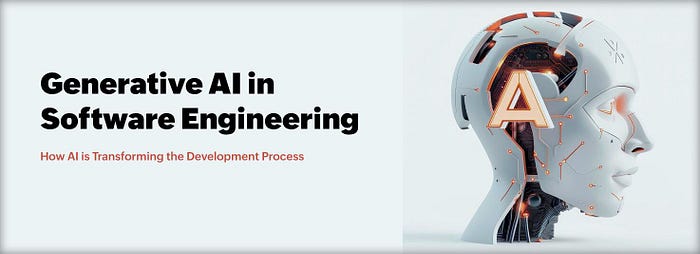Generative AI in Software Engineering: How AI is Transforming the Development Process
In recent years, the intersection of artificial intelligence (AI) and software engineering has led to groundbreaking innovations in the way software is developed, with generative AI emerging as a transformative force in the field. By harnessing the power of machine learning algorithms, generative AI is revolutionizing the software development process, enabling developers to automate tasks, generate code, and optimize workflows in unprecedented ways.

key applications of generative:
One of the key applications of generative AI in software engineering is automated code generation. Traditionally, writing code has been a time-consuming and error-prone process, requiring meticulous attention to detail and extensive manual effort. However, with the advent of generative AI, developers can now leverage advanced machine learning models to automatically generate code snippets, modules, and even entire applications based on high-level specifications and requirements.
Generative AI models:
Generative AI models, such as OpenAI’s GPT (Generative Pre-trained Transformer) series, are trained on vast repositories of code and programming languages, enabling them to understand syntax, semantics, and patterns inherent in software development. By inputting natural language descriptions or partial code snippets, these models can generate contextually relevant code suggestions, accelerate development cycles, and reduce the burden on developers.
AI is revolutionizing software:
Furthermore, generative AI is revolutionizing software testing and debugging processes. Traditional methods of software testing often involve manual inspection, exhaustive test suites, and time-consuming debugging sessions. However, generative AI can streamline these processes by automatically generating test cases, identifying edge cases, and predicting potential bugs or vulnerabilities in the codebase.
AI is facilitating collaboration and knowledge:
Moreover, generative AI is facilitating collaboration and knowledge sharing within development teams. By analyzing code repositories, documentation, and historical project data, AI models can generate contextual insights, provide recommendations, and assist developers in making informed decisions throughout the development lifecycle. Additionally, AI-powered code review tools can automatically flag code quality issues, adherence to coding standards, and potential security risks, enabling teams to maintain high standards of code hygiene and reliability.
Conclusion:
Generative AI is fundamentally transforming the software development process, empowering developers to automate repetitive tasks, accelerate development cycles, and enhance the quality and reliability of software applications. As AI continues to advance, its integration into software engineering workflows will become increasingly ubiquitous, unlocking new opportunities for innovation and efficiency in the digital age.
Contact Us: https://zcmp.in/Bz8D